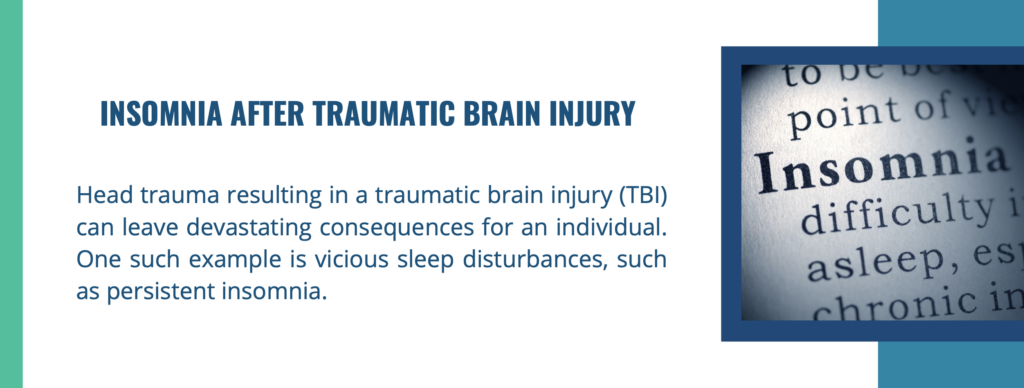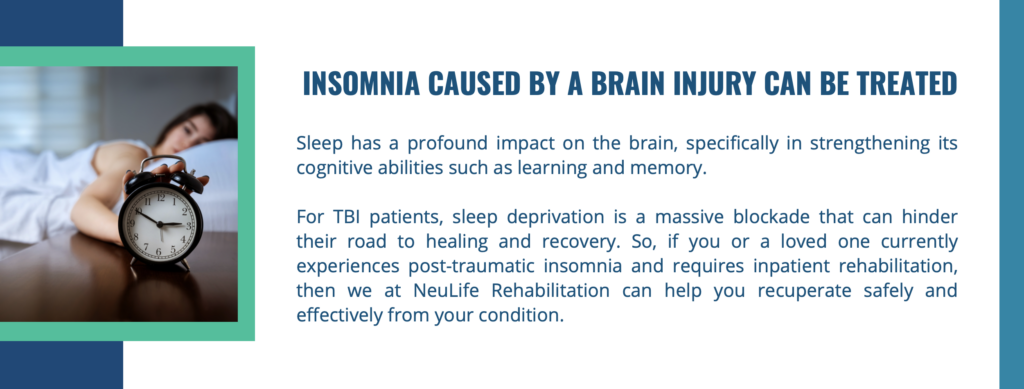A good night’s sleep is an important activity for people of all ages. It becomes even more vital for individuals recovering from an illness, a major surgery, or an injury.
According to studies, sleep plays a critical role in keeping every tissue of your body healthy. As you go into a deep slumber, your body repairs damaged cells, replenishes your energy, gets rid of toxic wastes, and enhances your immune function.
Unfortunately, many people find it challenging to maintain a healthy sleeping pattern. In fact, some individuals even suffer from severe sleeping troubles, specifically patients who have or are recovering from a traumatic brain injury.
Head trauma resulting in a traumatic brain injury (TBI) can leave devastating consequences for an individual. One such example is vicious sleep disturbances, such as persistent insomnia.
Read on below to learn more about why it happens and what you can do to improve your sleep quality.

A traumatic brain injury occurs when a brain sustains damage due to a sudden injury, such as a direct blow, violent jolt, or bump to the head. It can also be caused by a penetrating injury, such as a bullet that goes through the brain tissue.
Traumatic injuries can have a wide range of effects on the brain一from a simple headache and dizziness to concussions and seizures. Another aftereffect of a brain injury that might come out a little later than others are sleep disturbances, such as narcolepsy, sleep apnea, and insomnia.
According to research, 30% to 70% of patients with traumatic brain injuries commonly develop a sleep-wake disorder following their condition. Moreover, a chief sleep disturbance complaint of many patients is persistent insomnia with fatigue.
Insomnia refers to a condition characterized by an inability to fall or stay asleep. It is a sleeping disorder that occurs for various reasons, such as caffeine use, medication side effects, or an underlying medical condition. Some common symptoms of insomnia include:
There are several possible explanations why a traumatic brain injury may cause insomnia. This includes the following:
A traumatic brain injury can damage different parts of the brain, thus impairing the specific abilities that they control. So, an injury to the brain area (SCN) that regulates the body’s sleep-wake cycle can definitely cause a major disruption in one’s sleeping pattern.
Normally, the brain releases chemicals called neurotransmitters that signal a specific organ or body part to do its job or function. During sleeping time, your brain should release a neurotransmitter called GABA to stimulate sleep by calming the brain and inhibiting wakefulness.
Trauma to the head can damage the part of the brain responsible for releasing neurotransmitters. Additionally, injured nerve cells may not respond to these chemical messengers, thus causing insomnia.
Psychiatric disorders like depression, anxiety, and PTSD are all known to cause sleeping difficulties or insomnia. Unfortunately, a traumatic brain injury can exacerbate these mental illnesses, thus contributing to possible sleep disturbances.
Furthermore, studies suggest that TBI increases a person’s likelihood of developing depression and post-traumatic stress disorder.
It is common to experience mild to chronic pain after sustaining a traumatic injury to the head. Regrettably, not managing such discomfort can drastically affect one’s sleep quality through insomnia.
Moreover, chronic pain can worsen a TBI patient’s other medical conditions, such as depression, anxiety, and chronic fatigue. As mentioned above, these psychiatric diseases dramatically contribute to the steady decline of a patient’s sleep quality.

Sleep has a profound impact on the brain, specifically in strengthening its cognitive abilities such as learning and memory. It also provides the brain its much-needed rest to fortify each of its neural connections to enhance its function and improve recovery.
So, it is important to seek medical help or talk to your doctor if you experience sleeping difficulties after your brain injury. Your physician can prescribe the right medications or recommend therapies that can treat your post-traumatic insomnia.
Some of the most common treatment options that may be included in your plan of care are:
Cognitive behavioral therapy is a treatment program that helps patients identify specific behaviors and thoughts that causes insomnia. A trained CBT-I therapist will then help patients replace these identified behaviors with healthy habits to improve sleep quality.
For example, your therapist can help you relearn your body’s normal sleep-wake cycle by removing specific environmental factors that may affect your sleep. Some examples include a TV in the bedroom, using the phone before bedtime, or a brightly lit lamp on your bedside.
Some other activities that you may encounter once you enter a CBT program include:
CBT programs for insomnia may also be provided at specific facilities, such as a traumatic brain injury rehabilitation center or TBI residential facility.
On top of CBT, your physician or therapist may also recommend natural remedies to enhance your sleep quality. This includes melatonin supplements, herbal teas, essential oils, and magnesium supplements.
They may also encourage you to participate in relaxing activities, such as yoga, mindfulness meditation, massage, and acupuncture.
If the above-mentioned treatment options do not work, your physician may prescribe a low-dosage medication to help you sleep at night. However, they should perform a full health evaluation first to ensure that it won’t exacerbate your condition or negatively interact with your current medications.
For TBI patients, sleep deprivation is a massive blockade that can hinder their road to healing and recovery. So, if you or a loved one currently experiences post-traumatic insomnia and requires inpatient rehabilitation, then we at NeuLife Rehabilitation can help you recuperate safely and effectively from your condition.
At NeuLife, we are passionate about providing each patient with the right treatment plan that will suit their medical, emotional, mental, and psychological needs. Our programs are carefully structured to ensure that our patients will achieve their full functionality, independence, and highest quality of life.
Some of the comprehensive rehabilitation programs we offer include:
Contact us at 800-626-3876 or fill out this referral form to get in touch with our expert therapists and start your rehabilitation journey now!
The material contained on this site is for informational purposes only and DOES NOT CONSTITUTE THE PROVIDING OF MEDICAL ADVICE, and is not intended to be a substitute for independent professional medical judgment, advice, diagnosis, or treatment. Always seek the advice of your physician or other qualified healthcare providers with any questions or concerns you may have regarding your health.

We know that choosing the next step in your recovery from a catastrophic illness or injury is complex. Together, we can help you take the next step.
Contact us with any questions today.